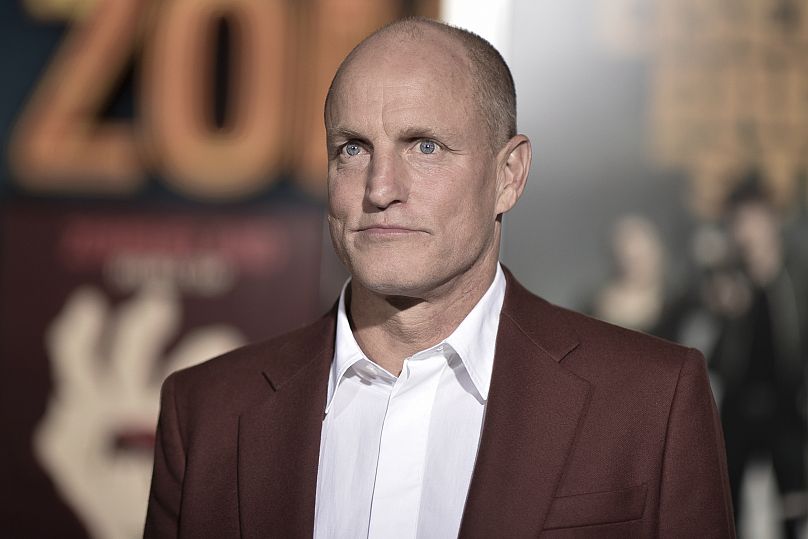Theories linking coronavirus and 5G have spread rapidly on and offline, leading to a suspected arson incident on a network mast. But is there any truth to the claims?
An increasing number of conversations on and offline have claimed to find insidious links between the roll out of 5G networks and coronavirus.
Claims suggesting that COVID-19 serves as a cover up for health hazards of 5G, or that the technology itself suppresses the immune system are just two of a number of theories in circulation that experts say are "baseless".
But celebrities have also joined the conversation, with US actor Woody Harrelson sharing a post on Instagram that linked 5G to the pandemic, and TV personality Jason Gardiner suggesting the World Health Organisation had warned against the mobile network due to the illness.
In the UK, the situation further intensified after reports that at least one phone mast was suspected to have been deliberately set on fire.
Network provider EE told Euronews in an email that its engineers were currently assessing the cause of a blaze at a mast in Birmingham that had caused "significant damage".
The company said: "If it transpires that it was arson, which looks likely at this time, then we will work to help West Midlands Police identify a culprit.
"To deliberately take away mobile connectivity at a time when people need more than ever to stay connected to each other is a reckless, harmful and dangerous thing to do.
"We will try to restore full coverage as quickly as possible, but the damage caused by the fire is significant."
West Midlands Police are yet to confirm the cause.
'Burn all the 5G masts down'
A video that allegedly showed the fire was shared in a local Facebook group, in which one user replied: "Good!! All these need to get burnt down!! Coronavirus is just a cover up... its 5G killing everyone. Its too powerful. These all need to go."
Another user said: "Get them all taken off or burn them. Save lives - simple reason if police ask what made you do it. Simple.
"Lives are precious and these material things are destroying life. Shame on government knowing what is going on in the world but keeping quiet and blaming rats and bats in China."
So - with this furore, is there actually any truth to the claims? And if so, should we be concerned?
What is 5G?
5G is a wireless mobile network that was deployed in 2019 to help improve telecommunications and mobile connectivity.
It works at a higher wave frequency than its predecessors in order to allow for this upgrade in usage.
What are the claims relating to 5G being harmful to health?
Prior to the outbreak of COVID-19, there were already discussions about the effects 5G could have on a person's health, due to these higher frequencies and the type of radiation it emits.
But since the outbreak, the 5G conversation seems to have found itself linked to the disease with people claiming it could exacerbate the spread through its frequencies, or by suppressing the immune system.
Others have claimed the virus is, in fact, being used to cover up dangerous effects of the mobile network.
So - is 5G linked to coronavirus?
The short answer is no.
In fact, the UK government has gone further to say there is "absolutely no credible link" between the two.
Meanwhile, Mobile UK, a trade union for British mobile providers, also commented on the "baseless" claims that it said were "not grounded in accepted scientific theory".
"More worryingly," it added: "Some people are also abusing our key workers and making threats to damage infrastructure under the pretence of claims about 5G.
"This is not acceptable and only impacts on our ability as an industry to maintain the resilience and operational capacity of the networks to support mass home working and critical connectivity to the emergency services, vulnerable consumers and hospitals."
READ MORE:
- EU-China ties tested during coronavirus pandemic
- Europeans warned to avoid 'temptation' of sunny spring weather
- 'Stay home, idiot!': Neighbours turn on each other as Europe's coronavirus lockdown tensions rise
Yusuf Sambo, a researcher at the University of Glasgow who is testing 5G in Scotland, told AFP that while he could acknowledge other health fears, they had nothing to do with viruses.
He said: "Yes, there are fears about the health implications of 5G but they have to do with cancer and not viral infections."
Is 5G linked to any health hazards at all?
Electromagnetic waves emit electromagnetic radiation, which at high frequencies are believed to pose a risk of causing cancer.
However, low frequencies - such as 5G frequencies - produce a non-ionising form of radiation that is not thought to be able to penetrate and damage cells.
5G frequencies may be higher than that of 4G and other earlier networks, but they are still far lower than the limits stipulated in international guidelines.
The World Health Organisation, which has a detailed guide on the mobile network, said "no adverse health effect has been causally linked with exposure to wireless technologies", even after "much research" was carried out.
It noted that only a few studies had been carried out on the frequencies used by 5G, but "provided that the overall exposure remains below international guidelines, no consequences for public health are anticipated."












